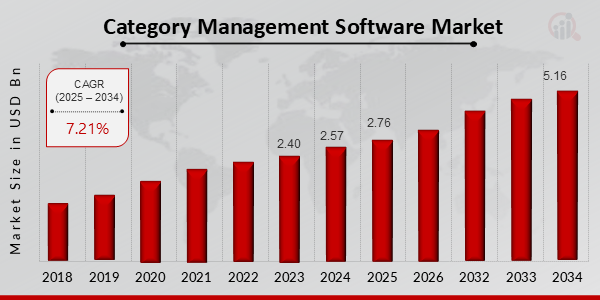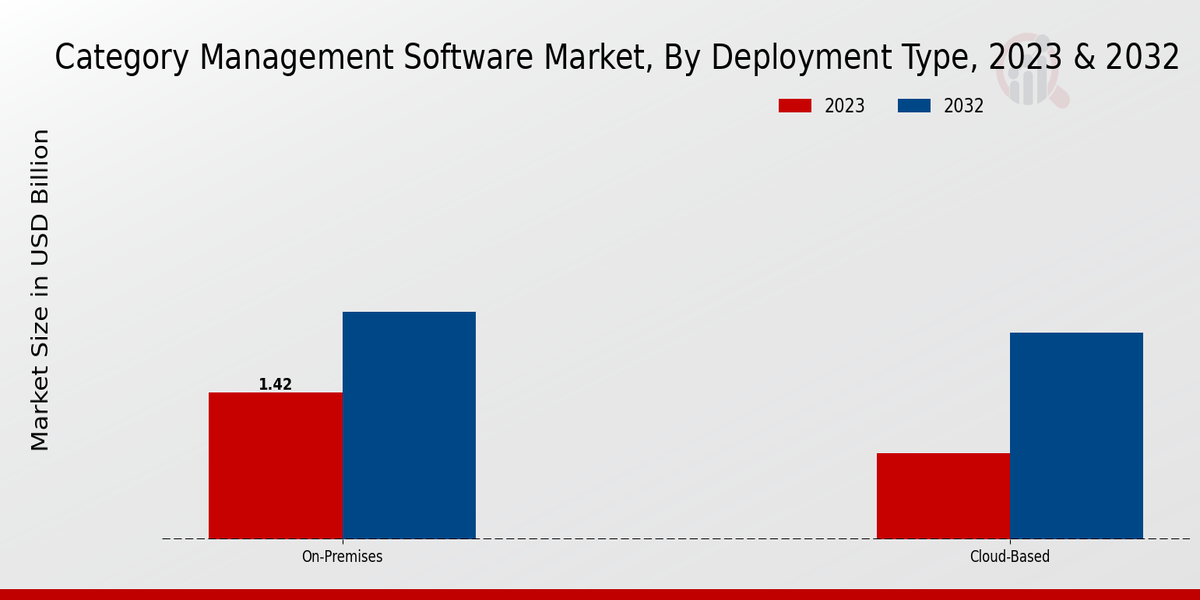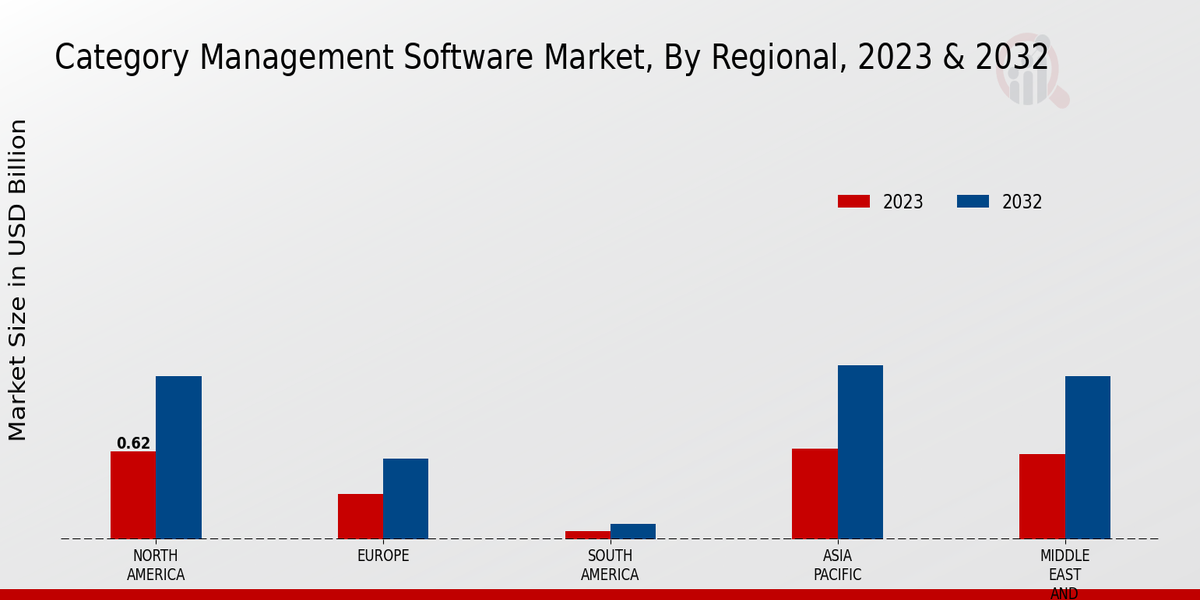Category Management Software Market Overview
Category Management Software Market is projected to grow from USD 2.76 Billion in 2025 to USD 5.16 Billion by 2034, exhibiting a compound annual growth rate (CAGR) of 7.21% during the forecast period (2025 - 2034). Additionally, the market size for Category Management Software Market was valued at USD 2.57 billion in 2024.
Key Category Management Software Market Trends Highlighted
The global market for category management software is projected to grow rapidly over the next few years, driven by the increasing need for businesses to optimize their procurement and supply chain processes. The growing complexity of global supply chains and the need for greater visibility and control over spending are also contributing to the growth of this market.
Key market trends include the adoption of cloud-based solutions, the increasing use of artificial intelligence (AI) and machine learning (ML) to automate tasks and improve decision-making, and the integration of category management software with other enterprise systems. Opportunities to be explored or captured in this market include the development of new software features and functionality to meet the specific needs of different industries, the expansion into new geographic markets, and the development of strategic partnerships with other technology providers.
Figure 1: Category Management Software Market, 2025 - 2034

Source: Primary Research, Secondary Research, MRFR Database and Analyst Review
Category Management Software Market Drivers
Rising Demand for Efficient Supply Chain Management
The increasing complexity of global supply chains has heightened the need for efficient and effective category management practices. Category management software helps businesses optimize their supply chains by providing a centralized platform to manage supplier relationships, track inventory levels, and streamline procurement processes. By leveraging category management software, businesses can reduce costs, improve supplier performance, and enhance overall supply chain visibility. The growing adoption of supply chain management best practices, coupled with the need to manage complex global supply chains, is driving the demand for category management software solutions. This trend is expected to continue in the coming years as businesses seek to gain a competitive advantage by optimizing their supply chain operations.
Need for Improved Collaboration and Communication
Effective category management requires seamless collaboration and communication among various stakeholders, including procurement, supply chain, and finance teams. Category management software facilitates collaboration by providing a central platform for stakeholders to share information, track progress, and make informed decisions. By breaking down silos and enabling better coordination, category management software improves the efficiency and effectiveness of category management processes. The need for improved collaboration and communication is a key factor driving the adoption of category management software in the Category Management Software Market.
Growing Focus on Data Analytics and Insights
Data analytics plays a crucial role in modern category management practices. Category management software provides advanced analytics capabilities that enable businesses to gain insights into spending patterns, supplier performance, and market trends. By leveraging data analytics, businesses can identify opportunities for cost savings, optimize supplier relationships, and make data-driven decisions. The growing focus on data-driven decision-making is a significant driver of the category management software market. Businesses are increasingly recognizing the value of data and analytics in improving their category management strategies.
Category Management Software Market Segment Insights
Category Management Software Market Deployment Type Insights
The Category Management Software Market is segmented by deployment type into On-Premises and Cloud-based. The On-Premises segment accounted for 40% of the Category Management Software Market revenue in 2023 and is expected to decline to 30% by 2032. The Cloud-Based segment is expected to grow from 60% of the market revenue in 2023 to 70% by 2032. The On-Premises deployment type involves installing and managing the software on the organization's own servers. This deployment type provides greater control over data security and customization and is often preferred by organizations with sensitive data or compliance requirements.
However, On-Premises deployment can be more expensive and complex to implement and maintain. The Cloud-Based deployment type involves accessing the software over the internet, typically on a subscription basis. This deployment type offers scalability, flexibility, and lower upfront costs and is often preferred by organizations with limited IT resources or that require quick deployment. The growth of the Cloud-based segment is attributed to the increasing adoption of cloud computing, the growing demand for remote work and collaboration, and the need for cost-effective and scalable solutions. The On-Premises segment is expected to continue to decline due to the rising popularity of cloud-based solutions and the increasing adoption of SaaS (Software-as-a-Service) models.
Figure 2:Category Management Software Market, By Condition, 2023 & 2032

Source: Primary Research, Secondary Research, MRFR Database and Analyst Review
Category Management Software Market Business Function Insights
The Category Management Software Market is segmented by business function into Retail Merchandising, Customer Relationship Management (CRM), and Enterprise Resource Planning (ERP). The Retail Merchandising segment accounted for the largest share of the market in 2023 and is expected to continue to dominate the market during the forecast period. The growth of this segment can be attributed to the increasing adoption of category management software by retailers to improve their sales and profitability. The CRM segment is expected to witness significant growth over the forecast period due to the growing need for businesses to manage their customer relationships effectively. The ERP segment is also expected to grow steadily over the forecast period as businesses seek to integrate their category management software with their other business systems.
Category Management Software Market Vertical Insights
The Industry Vertical segment plays a crucial role in shaping the Category Management Software Market. Among the key verticals, Consumer Packaged Goods (CPG) dominated the market in 2023 and is projected to maintain its lead throughout the forecast period. The CPG industry's complex supply chains and vast product portfolios drive the demand for effective category management solutions. Other notable verticals include Retail and Wholesale, Manufacturing, Healthcare, and Food and Beverage. The Retail and Wholesale segment is witnessing significant growth due to the increasing adoption of category management strategies to optimize product assortments and enhance customer experiences.
The Manufacturing industry also presents substantial opportunities for category management software providers as manufacturers seek to improve operational efficiency and reduce costs. Healthcare and Food and Beverage verticals are also witnessing growing demand for category management solutions to streamline procurement processes and ensure compliance with regulatory requirements. Overall, the Industry Vertical segment offers a diverse landscape for category management software vendors, with each vertical presenting unique challenges and opportunities.
Category Management Software Market Organization Size Insights
The Category Management Software Market is segmented based on organization size into Small and Medium Enterprises (SMEs) and Large Enterprises. The Large Enterprises segment is expected to hold a market share of around 65% in 2024, owing to the increasing adoption of category management software solutions to streamline their procurement processes and optimize spend. This segment is poised to grow at a CAGR of 7.5% during the forecast period of 2024-2032. The SMEs segment, on the other hand, is projected to witness a CAGR of 8.2% over the same period, driven by the growing need for cost optimization and improved efficiency in procurement.
Category Management, Software Market Product, Features Insights
The Category Management Software Market is segmented by product features, which include supplier relationship management, demand forecasting, assortment planning, pricing optimization, and inventory management. The supplier relationship management segment is expected to hold the largest market share in 2024, accounting for over 30% of the global market revenue. This is due to the growing need for organizations to manage their supplier relationships effectively in order to reduce costs and improve efficiency.
The demand forecasting segment is expected to grow at the highest CAGR during the forecast period as organizations increasingly rely on data analytics to improve their demand planning accuracy. The assortment planning segment is expected to account for a significant share of the global market revenue in 2024, as retailers focus on optimizing their product offerings to meet the needs of their customers. The pricing optimization segment is expected to grow at a steady pace during the forecast period, as organizations look to optimize their pricing strategies to maximize profitability. The inventory management segment is expected to account for a moderate share of the global market revenue in 2024 as organizations focus on improving their inventory management practices to reduce costs and improve efficiency.
Category Management Software Market Regional Insights
The regional segmentation of the Category Management Software Market offers valuable insights into the market's geographical distribution and growth potential. North America is expected to dominate the market, with a significant share of the Category Management Software Market revenue. The region's established retail and e-commerce sectors, coupled with the presence of leading technology providers, contribute to its dominance. Europe follows closely, driven by the growing adoption of digital transformation initiatives and the presence of a large number of retail and manufacturing companies. APAC is projected to witness substantial growth, fueled by the increasing adoption of category management solutions in emerging economies like China and India. South America and MEA also present promising growth opportunities, as businesses in these regions seek to improve their supply chain efficiency and optimize their product assortments.
Figure 3: Category Management Software Market, By Regional, 2023 & 2032

Source: Primary Research, Secondary Research, MRFR Database and Analyst Review
Category Management Software Market Key Players and Competitive Insights
Major players in the Category Management Software Market are constantly striving to innovate and develop advanced solutions that meet the evolving needs of businesses. They focus on ongoing Category Management Software Market research and development to improve product functionality, user experience, and integration with other systems. Leading Category Management Software Market players engage in strategic partnerships, acquisitions, and collaborations to expand their market reach and gain a competitive edge. The competitive landscape is characterized by intense competition, with vendors vying for market share through various strategies such as product differentiation, pricing, and customer support.
The Category Management Software Market development is driven by the increasing adoption of digital transformation initiatives across industries, leading to a growing demand for software solutions that optimize procurement processes. Ivalua is a leading provider of Category Management Software Market solutions. The company offers a comprehensive suite of software tools designed to help businesses manage their procurement processes more efficiently. Ivalua's solutions are used by a wide range of companies, including Fortune 500 enterprises and government agencies. The company has a strong track record of innovation and has been recognized for its leadership in the Category Management Software Market.
SAP is a multinational software corporation that provides a wide range of enterprise software solutions. The company's Category Management Software Market offerings include solutions for spend analysis, supplier management, and contract management. AP's solutions are used by a wide range of companies, including large enterprises and small businesses. The company has a strong global presence and has been recognized for its leadership in the enterprise software market.
Key Companies in the Category Management Software Market Include
Category Management Software Market Developments
The growing need for efficient and effective category management to optimize procurement processes, reduce costs, and improve supplier relationships is driving market growth. Additionally, the increasing adoption of cloud-based category management solutions and the integration of artificial intelligence (AI) and machine learning (ML) technologies are further fueling market expansion. Recent news developments include partnerships and acquisitions, such as the collaboration between Ivalua and Coupa Software to enhance their category management offerings.
Category Management Software Market Segmentation Insights
-
Category Management Software Market Deployment Type Outlook
-
Category Management Software Market Business Function Outlook
- Customer Relationship Management (CRM)
- Enterprise Resource Planning (ERP)
-
Category Management Software Market Vertical Outlook
- Consumer Packaged Goods (CPG)
-
Category Management Software Market Organization Size Outlook
- Small and Medium Enterprises (SMEs)
-
Category Management Software Market Product Features Outlook
- Supplier Relationship Management
-
Category Management Software Market Regional Outlook
|
Report Attribute/Metric
|
Details
|
|
Market Size 2024
|
2.57 (USD Billion)
|
|
Market Size 2025
|
2.76 (USD Billion)
|
|
Market Size 2034
|
5.16 (USD Billion)
|
|
Compound Annual Growth Rate (CAGR)
|
7.21% (2025 - 2034)
|
|
Report Coverage
|
Revenue Forecast, Competitive Landscape, Growth Factors, and Trends
|
|
Base Year
|
2024
|
|
Market Forecast Period
|
2025 - 2034
|
|
Historical Data
|
2019 - 2023
|
|
Market Forecast Units
|
USD Billion
|
| Key Companies Profiled |
Ivalua., SynerTrade Technologies., Determine, Inc., IBM Corporation., JAGGAER., Empronc Solutions., Supply Dynamics., Onventis GmbH., GEP Worldwide., Oracle Corporation., BravoSolution., SAP SE., SciQuest., Zycus., Coupa Software. |
| Segments Covered |
Deployment Type, Business Function, Industry Vertical, Organization Size, Product Features, Regional |
| Key Market Opportunities |
Rapid adoption of cloud-based services Growing need for spending optimization Increasing focus on supply chain agility Heightened demand for real-time data analytics Growing adoption of AIML |
| Key Market Dynamics |
Rising adoption of digital technologies Growing need for efficient spend management Increasing demand for data-driven decision-making |
| Countries Covered |
North America, Europe, APAC, South America, MEA |
Frequently Asked Questions (FAQ) :
The Category Management Software Market is expected to be valued at USD 2.40 billion in 2023 and is projected to reach a value of USD 5.16 billion by 2034, exhibiting a CAGR of 7.21% during the forecast period.
North America is expected to dominate the Category Management Software Market throughout the forecast period. In 2023, the region accounted for a market share of around 40% and is projected to maintain its dominance during the forecast period.
The growth of the Category Management Software Market is attributed to the increasing adoption of digital transformation, the need for efficient and effective supply chain management, and the growing popularity of cloud-based solutions.
Some of the key competitors in the Category Management Software Market include SAP SE, Oracle Corporation, IBM Corporation, Infor Inc., and JDA Software Group, Inc.
Category Management Software finds applications in various industries, including retail, manufacturing, healthcare, and hospitality. It helps businesses optimize their product assortment, negotiate better deals with suppliers, and improve their overall profitability.
The Category Management Software Market faces challenges such as the lack of skilled professionals, the complexity of implementation, and the high cost of ownership. However, the growing awareness of the benefits of Category Management Software is expected to mitigate these challenges in the long run.
The latest trends in the Category Management Software Market include the adoption of artificial intelligence (AI) and machine learning (ML) technologies, the increasing popularity of cloud-based solutions, and the emergence of new players in the market.
The future outlook for the Category Management Software Market is positive, with the market expected to continue growing at a steady pace in the coming years. The increasing adoption of digital transformation and the need for efficient supply chain management are expected to drive the growth of the market.
The key opportunities for growth in the Category Management Software Market include the expansion into new markets, the development of new innovative solutions, and the acquisition of smaller players in the market.
The key challenges for growth in the Category Management Software Market include the lack of skilled professionals, the complexity of implementation, and the high cost of ownership.

















